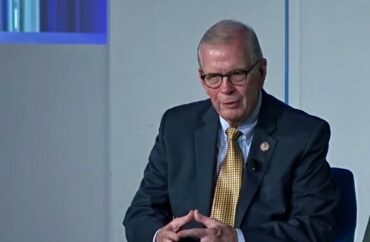
Education committee chair praises trade and apprenticeship programs as confidence in higher ed dwindles
Congressman Tim Walberg, the new chair of the U.S. House Committee on Education and Workforce, expressed hope for the future of education under the Trump administration Wednesday in a talk about federal policy.
Hosted by the American Enterprise Institute, the event featured AEI Senior Fellow Beth Akers sitting down with Walberg to discuss K-12 and higher education in the United States.
Walberg, (pictured) a Michigan Republican, said he believes President Jimmy Carter’s decision to create the Department of Education was a “mistake,” and he is “delighted” by President Donald Trump’s plan to close it.
Doing so would make the government more productive, and would lead to issues in education being solved at the state and local levels, he said.
“I would love, in some ways, to be historically the last chairman of the education committee,” Walberg said.
The Trump administration’s actions so far have made society take a look at the education system as a whole, and change what previously would have never been seen as an issue, Walberg said.
“President Trump is a disruptor … but I think it’s good,” he said, adding that leaders can become too complacent, especially in the education sector.
“When the president knows that he’s going to receive lawsuits from Harvard and other schools when he declares that funding for research is gone… it’s caused a lot of citizens, on both sides of the aisle, to look at … why can a school step on people’s rights and get away with it,” Walberg said.
In April, Harvard sued the Trump administration for pausing more than $2.2 billion in funding, The College Fix reported. The reason was the Ivy League school’s refusal to comply with the Trump administration’s reforms regarding diversity, equity, and inclusion programs and antisemitism.
Thanks to Trump’s strong actions, Walberg said the House education committee can do things it “wouldn’t have thought about doing” in the past.
He said his top priorities are to promote “more success for students, parents and teachers.”
Walberg said the most important part of the education system is these individuals, and he hopes to bring them back to the forefront of any and all legislation during his time as chairman, which he said is a “dream come true.”
At the beginning of his talk, Walberg highlighted the fact that the name of his committee changed. Before it was “the Workforce,” whereas now it is simply “Workforce.”
“I think the ‘the’ is an important change. I believe education and workforce go together hand in hand, and must be together…so it’s education and workforce.”
He praised the “rapid increase in opportunities” outside traditional four-year college programs, including apprenticeships and trade school programs, and brought up the need to expand these even more.
When speaking about higher education, Akers said Americans’ confidence in higher education has been declining in recent years.
Walberg said the lack of trust is “coming from reality.”
He pointed to the antisemitism and “violent demonstrations” at Columbia University, and more widespread problems with “anti-American indoctrination” on college campuses.
The congressman also discussed the idea of school choice in both K-12 and higher education. For K-12 education, this is the choice between public, private, charter or homeschool; for higher education, it is the choice of which institution to go to, if any at all.
“It really has brought me to a point that I now have the chance, if we do it right, to help people understand that it is key to give choice in education,” Walberg said.
Walberg said choice leads to competition, which can grow an institution for the better.
Finally, Akers brought up the topic of reconciliation and budget cuts.
Walberg said he was “proud” to find $351 billion in savings through his committee, after being told there was an estimated $330 billion to cut.
Most of this money (around $225 billion) was saved through the retraction of a student debt forgiveness program enacted under President Joe Biden’s administration, Walberg said.
The way student loans are handled now is better, and any student who stays in compliance with their loan agreement will never pay more than the contracted amount, he said.
This “gives hope” to students that with each payment, their debt is decreasing, and will continue to do so as long as they follow the agreements made in their original loans, he said.
“We want you to succeed in the field you’ve chosen. We don’t want to put you in a financial bind that you never come out of, and hold you back from succeeding well after you graduate,” Walberg said.
MORE: Feds launch investigation into Harvard Law Review for alleged ‘race-based discrimination’
IMAGE CAPTION AND CREDIT: U.S. Rep. Tim Walberg of Michigan discusses his role as chair of the House Education and Workforce Committee. AEI/YouTube
Like The College Fix on Facebook / Follow us on Twitter






Please join the conversation about our stories on Facebook, Twitter, Instagram, Reddit, MeWe, Rumble, Gab, Minds and Gettr.